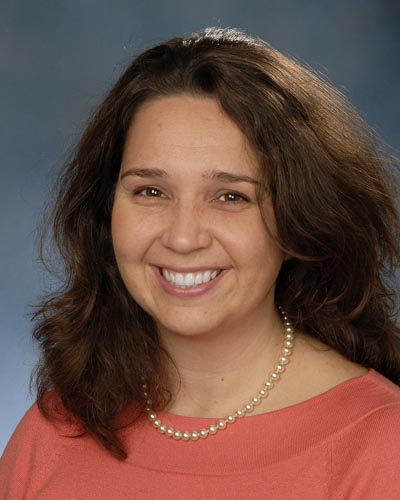February 15, 2022 | Deborah Kotz
Warren Alpert Foundation Provides Funds to Expand Workforce of Genetic Counselors Who Embrace Critical Values of Diversity, Equity, Justice, and Inclusivity
University of Maryland School of Medicine (UMSOM) faculty members in the Master’s in Genetic Counseling (MGC) Training Program have been awarded a $1.87 million grant from the Warren Alpert Foundation (WAF) to recruit and retain genetic counseling students from diverse backgrounds, both at the level of incoming students and as practicing genetic counselors.
 Shannan Dixon, MS, CGC, Director, Master's in Genetic Counseling Training Program at UMSOM will lead the program in Baltimore. The University of Pennsylvania Perelman School of Medicine’s Masters of Science in Genetic Counseling Program will lead the multi-state effort which received $9.5 million in total funding from WAF.
Shannan Dixon, MS, CGC, Director, Master's in Genetic Counseling Training Program at UMSOM will lead the program in Baltimore. The University of Pennsylvania Perelman School of Medicine’s Masters of Science in Genetic Counseling Program will lead the multi-state effort which received $9.5 million in total funding from WAF.
The grant will establish the first Alliance to Increase Diversity in Genetic Counseling. It will support 40 underrepresented students in five genetic counseling programs in the Northeastern US over five years to expand all dimensions of diversity. Ten students will be selected yearly to receive full tuition support and a cost-of-living stipend. Other participating programs include the Masters in Genetic Counseling at Boston University, Rutgers University, and Sarah Lawrence College.
"Expanding diversity and inclusion in genetic counseling is a crucial goal, as well as increasing the overall genetic counseling workforce," said Ms. Dixon. “We are honored to receive this grant from the Warren Alpert Foundation to address a critical need as genomic medicine applications continue to rapidly advance.”
The University of Maryland School of Medicine offers a Master's in Genetic Counseling Training Program for individuals interested in becoming part of the expanding field of medical genetics. The program addresses the growing need for clinically oriented genetics professionals who understand the impact of the developing field of human genetics on individuals, families, and the community. The objective of the MGC program is to train well-rounded master's-level genetic counselors with a thorough understanding of the complex issues inherent in this field.
 “Our MGC program faculty have established themselves as leaders in the field, and this new grant will enable them to expand the graduate program’s reach to include more students from diverse backgrounds,” said E. Albert Reece, MD, PhD, MBA, Executive Vice President for Medical Affairs, UM Baltimore, and the John Z. and Akiko K. Bowers Distinguished Professor and Dean, University of Maryland School of Medicine. "The overarching goal is to increase access to community-based genetic counseling services delivered by professionals who reflect the diversity of these communities.”
“Our MGC program faculty have established themselves as leaders in the field, and this new grant will enable them to expand the graduate program’s reach to include more students from diverse backgrounds,” said E. Albert Reece, MD, PhD, MBA, Executive Vice President for Medical Affairs, UM Baltimore, and the John Z. and Akiko K. Bowers Distinguished Professor and Dean, University of Maryland School of Medicine. "The overarching goal is to increase access to community-based genetic counseling services delivered by professionals who reflect the diversity of these communities.”
About the University of Maryland School of Medicine
Now in its third century, the University of Maryland School of Medicine was chartered in 1807 as the first public medical school in the United States. It continues today as one of the fastest growing, top-tier biomedical research enterprises in the world -- with 46 academic departments, centers, institutes, and programs, and a faculty of more than 3,000 physicians, scientists, and allied health professionals, including members of the National Academy of Medicine and the National Academy of Sciences, and a distinguished two-time winner of the Albert E. Lasker Award in Medical Research. With an operating budget of more than $1.2 billion, the School of Medicine works closely in partnership with the University of Maryland Medical Center and Medical System to provide research-intensive, academic and clinically based care for nearly 2 million patients each year. The School of Medicine has nearly $600 million in extramural funding, with most of its academic departments highly ranked among all medical schools in the nation in research funding. As one of the seven professional schools that make up the University of Maryland, Baltimore campus, the School of Medicine has a total population of nearly 9,000 faculty and staff, including 2,500 students, trainees, residents, and fellows. The combined School of Medicine and Medical System (“University of Maryland Medicine”) has an annual budget of over $6 billion and an economic impact of nearly $20 billion on the state and local community. The School of Medicine, which ranks as the 8th highest among public medical schools in research productivity (according to the Association of American Medical Colleges profile) is an innovator in translational medicine, with 606 active patents and 52 start-up companies. In the latest U.S. News & World Report ranking of the Best Medical Schools, published in 2021, the UM School of Medicine is ranked #9 among the 92 public medical schools in the U.S., and in the top 15 percent (#27) of all 192 public and private U.S. medical schools. The School of Medicine works locally, nationally, and globally, with research and treatment facilities in 36 countries around the world. Visit medschool.umaryland.edu
Contact
Deborah Kotz
410-706-4255 or 410-504-0054 (cell)
dkotz@som.umaryland.edu

